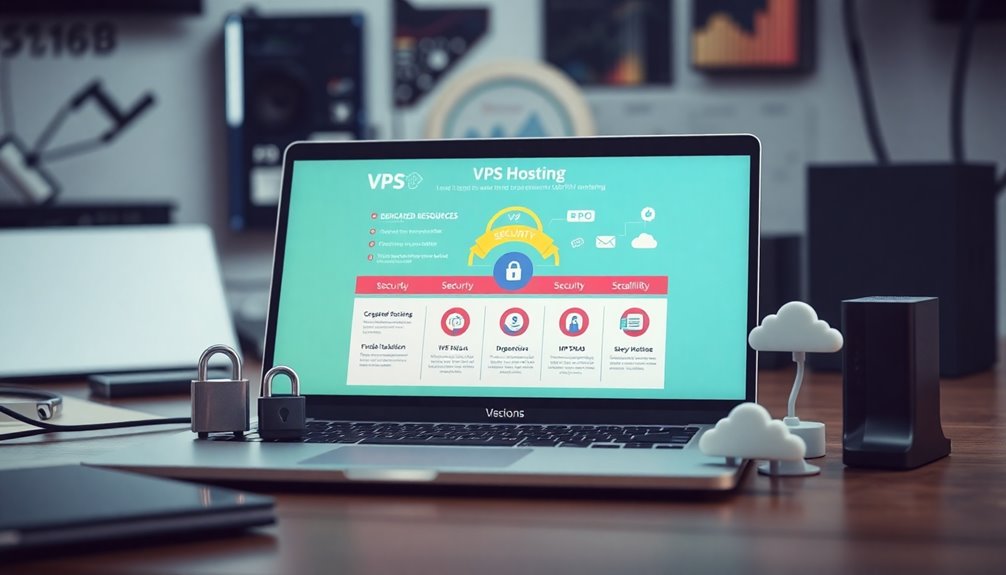VPS hosting offers you dedicated resources like CPU and RAM, giving your website better performance and stability. It works by splitting a physical server into several virtual environments, each functioning independently. There are different types of VPS, including managed and unmanaged, to suit your needs. While it comes with advantages like enhanced security and scalability, it's crucial to weigh the pros and cons. Explore more to find out how to choose the right VPS hosting provider for your needs.
Key Takeaways
- VPS hosting provides dedicated resources like CPU and RAM, ensuring consistent performance for websites and applications.
- It operates through virtualization technology, allowing multiple independent virtual servers on a single physical server.
- Users have root access to install and configure software, offering greater control over their server environment.
- VPS hosting is scalable, allowing users to easily upgrade resources as their needs grow without significant downtime.
- It offers enhanced security compared to shared hosting, as each VPS operates in isolation, reducing malware risks.
What Is VPS Hosting?

VPS hosting is like having your own private slice of a powerful server. With a virtual private server, you get dedicated resources like CPU, RAM, and storage, ensuring reliable performance for your growing website or application.
Unlike shared hosting, VPS offers you root access, letting you install and configure software as you wish, much like a dedicated server, but at a lower cost.
Utilizing advanced virtualization technology, VPS isolates your environment from others on the same physical machine, enhancing security and reducing risks of malware and unauthorized access.
This setup not only provides a scalable solution but also offers ample customization options, making it ideal for eCommerce platforms and applications that demand consistent performance.
How Does VPS Hosting Work?

VPS hosting operates on virtualization technology, which splits a physical server into multiple virtual servers, each with its own set of resources.
A hypervisor manages this process, ensuring that your VPS runs independently from others for peak performance and security.
This setup allows you to fully control your environment, tailoring it to meet your specific needs.
Virtualization Technology Explained
While exploring hosting options, you might be intrigued by how virtualization technology enables VPS hosting to function effectively. This technology uses a hypervisor to create multiple isolated virtual environments on a single physical server.
Each VPS has dedicated resources like CPU, RAM, and storage, ensuring performance remains stable, regardless of other users. The hypervisor manages the distribution of these resources, allowing each VPS to operate independently with its own operating system and applications.
You gain root access, which lets you install software, configure settings, and enhance security without interference. Furthermore, this virtualization process promotes efficient resource utilization, dynamically allocating physical server resources to meet the varying demands of different VPS instances.
Hypervisor's Role
Understanding virtualization technology sets the stage for recognizing the hypervisor's role in VPS hosting.
The hypervisor acts as an essential virtualization layer, allowing multiple virtual machines (VMs) to coexist on a single physical server. It efficiently allocates dedicated resources like CPU, RAM, and storage to each VPS, ensuring that one server's performance doesn't impact another's.
With full root access, you can install and customize your operating system, gaining control over your server environment.
The hypervisor also manages communication between the hardware and virtual servers, enabling efficient resource utilization. This results in cost-effective VPS hosting solutions, providing you with a powerful and flexible option tailored to your needs while maximizing performance and stability.
Resource Isolation Mechanism
When you choose VPS hosting, you're tapping into a resource isolation mechanism that guarantees each virtual server operates independently.
The hypervisor partitions a physical server into multiple virtual servers, each with dedicated resources like CPU, RAM, and storage. This setup prevents performance issues caused by other users, ensuring smooth operation for your applications.
You get your own operating system, allowing for customization without affecting others. Enhanced security is another benefit, as activities on your VPS won't interfere with other servers, reducing malware risks.
Plus, you gain root access, enabling you to install software, configure settings, and manage security measures tailored to your specific needs. This independence makes VPS hosting an excellent choice for your projects.
Types of VPS Hosting

Choosing the right type of VPS hosting can greatly impact your website's performance and management experience.
If you lack technical expertise, Managed VPS Hosting is ideal, as your hosting provider handles all server management and support.
On the other hand, Unmanaged VPS Hosting gives you full control, requiring advanced technical skills for configurations and maintenance.
If you want a balance, consider Semi-managed VPS Hosting, where you get essential support while managing most aspects yourself.
For those needing flexibility, Cloud VPS Hosting offers scalable resources, allowing you to pay only for what you use.
Finally, Multi VPS Hosting lets you manage multiple VPS instances within one account, perfect for running various projects efficiently.
Managed Vs Unmanaged VPS

Deciding between Managed and Unmanaged VPS hosting often hinges on your technical skills and the level of support you need.
Here's what you should consider:
- Technical Support: Managed VPS offers full support, ensuring peace of mind for beginners.
- Control: Unmanaged VPS gives you complete root access and customization, but it demands user expertise.
- Cost: Managed VPS typically costs more due to the additional services, while unmanaged options can save you money if you're skilled.
If you want minimal hassle, go for managed VPS.
However, if you crave control and have the know-how, unmanaged VPS might be your best bet.
There's also the semi-managed VPS, striking a balance between support and user responsibility.
Choose wisely!
Who Should Consider VPS Hosting?

VPS hosting caters to a variety of needs, making it a smart choice for several types of users.
If you're running a growing website or blog facing increased traffic, VPS hosting can provide the resources you need beyond shared hosting.
eCommerce businesses, especially, should consider it for strong security and reliable performance during transactions to protect customer data.
Developers managing multiple sites or custom applications will appreciate the full server control and customization options VPS hosting offers.
Additionally, if your business relies on resource-heavy applications, VPS hosting allows for dedicated resources tailored to your needs.
Finally, organizations handling sensitive data can benefit from enhanced security measures and isolated environments, ensuring your information remains protected.
Pros and Cons of VPS Hosting

When considering hosting options, you'll find that VPS hosting offers a unique balance of benefits and drawbacks. Here are some key points to ponder:
- Better Performance: With dedicated resources, your website enjoys faster loading times compared to shared hosting.
- Enhanced Security: Each virtual server is isolated, markedly reducing malware risks from other users.
- Scalability: You can easily upgrade resources as your needs grow, ensuring minimal downtime.
However, you should consider that VPS hosting can demand a higher level of technical knowledge, especially with unmanaged plans.
While it's a cost-effective solution compared to dedicated hosting, the control over your server comes with responsibilities.
Weigh these pros and cons carefully to determine if VPS hosting is the right fit for you.
Alternatives to VPS Hosting

If VPS hosting isn't the right fit for you, consider shared hosting as a budget-friendly option for beginners and low-traffic sites.
On the other hand, dedicated hosting offers you full control and performance, perfect for large websites and businesses that need to handle high traffic.
Each alternative has its unique benefits, so it's worth exploring which one aligns best with your needs.
Shared Hosting Overview
For those just starting out or running small businesses with low traffic, shared hosting presents a budget-friendly option that allows you to host your website without the complexities of dedicated server management.
While it's an affordable hosting option, there are important considerations:
- Limited Control: You won't have full access to server resources, which can restrict your site's growth.
- Inconsistent Performance: During peak times, load times may slow down, leading to frustration for you and your visitors.
- Security Risks: Vulnerabilities in one site can impact others on the same server, making security a concern.
However, shared hosting offers user-friendly interfaces and basic technical support, making it suitable for those with minimal technical knowledge.
Just weigh the pros and cons carefully!
Dedicated Hosting Benefits
While shared hosting suits many small businesses, dedicated hosting stands out as a powerful alternative, especially for those with growing needs. By utilizing a dedicated server, you gain maximum performance and control over your server configurations. This option is perfect for large websites or high-traffic businesses, offering superior resource allocation without the competition for shared resources. You'll also benefit from enhanced security measures, greatly reducing vulnerabilities.
| Feature | Dedicated Hosting |
|---|---|
| Resource Allocation | Superior |
| Security | Enhanced Security Measures |
| Ideal For | Complex Databases & High-Performance Web Applications |
| Cost | More Expensive |
Although it's pricier, the processing power and data storage capabilities make it worth considering for demanding applications.
Key Features of VPS Hosting

VPS hosting stands out for its unique blend of dedicated resources and control, making it an ideal solution for users seeking reliable performance.
Here are some key features that make VPS hosting a top choice:
- Dedicated Resources: You get your own CPU, RAM, and storage, ensuring consistent performance without interruptions from others.
- Full Control: With root access, you have complete control over your server environment, allowing easy software installation and custom configurations.
- Enhanced Security: The isolated nature of each virtual server reduces the risk of malware, providing a more secure environment than shared hosting.
Additionally, VPS hosting offers high uptime guarantees of around 99.9% and scalability options, enabling you to upgrade resources effortlessly as your traffic grows.
How to Choose the Right VPS Hosting Provider

Choosing the right VPS hosting provider is essential for the success of your website or application, especially since the performance and reliability can greatly impact user experience.
Start by evaluating the management level you need—decide between managed VPS plans, unmanaged, or semi-managed options based on your technical expertise.
Assess the performance specifications, focusing on CPU, RAM, and bandwidth to guarantee they meet your requirements.
Look for uptime guarantees of at least 99.9% to keep your site accessible.
Consider scalability options that allow you to easily upgrade resources as your website grows.
Finally, investigate customer support availability—opt for providers offering 24/7 assistance through multiple channels to ensure you can control every aspect during critical times.
Frequently Asked Questions
What Are the Disadvantages of VPS Hosting?
When you consider VPS hosting, you should be aware of its disadvantages.
It can be pricier than shared hosting, which might strain your budget.
If you're opting for unmanaged VPS, you'll need strong technical skills to manage it effectively.
Resource limitations on lower-tier plans could force you to upgrade as your site grows.
Plus, managing security and updates can add to your workload, and hardware failures may lead to downtime for all users on that server.
What Can I Host on My VPS?
Imagine your VPS as a versatile stage, ready for a variety of performances. You can host anything from personal blogs to bustling eCommerce sites, adapting to your audience's needs.
Want to run a game server for friends? Go ahead! You can also set up email services for your business or guarantee your databases are secure and swift.
Whatever your vision, your VPS can bring it to life with tailored resources and performance.
What Is the Use of VPS Hosting?
VPS hosting's primary use is to provide a stable, dedicated environment for your websites and applications.
You can run eCommerce platforms, ensuring secure transactions and fast loading times. It also supports developers in testing and deploying applications, giving you full root access for custom setups.
Plus, you can host email, gaming, or database servers, making it an adaptable solution that grows with your needs as your traffic and resource demands increase.
What Is a VPS Best For?
A VPS is best for you if you're running a growing website or blog that needs dedicated resources.
It's perfect for eCommerce platforms requiring strong security and reliable uptime.
If you manage multiple sites or custom applications, a VPS gives you full control over your server environment.
You can also customize it for unique needs, making it ideal for resource-heavy applications, email servers, or even gaming servers.
Conclusion
In conclusion, VPS hosting offers a perfect blend of performance and control for those needing more than shared hosting. Did you know that 70% of businesses using VPS hosting report improved website performance? This statistic highlights the tangible benefits of making the switch. If you're seeking reliability and scalability, VPS could be your ideal solution. Take the time to choose the right provider, and you'll access the full potential of your online presence.









